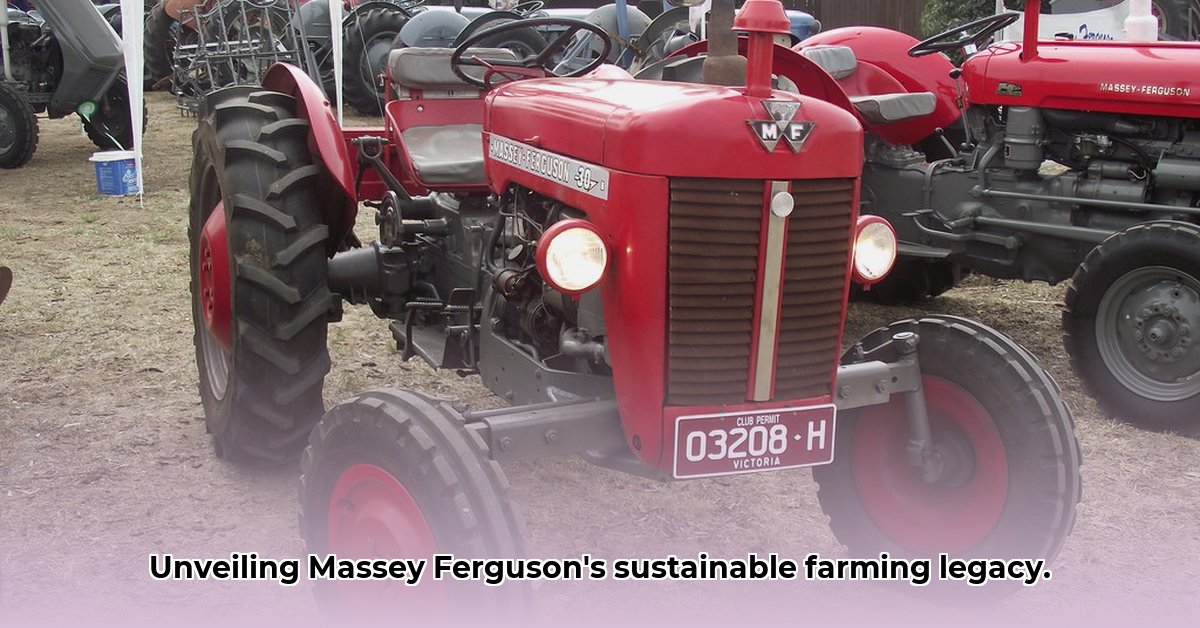
The Massey Ferguson 30 (MF30), a stalwart of the agricultural landscape from 1963 to 1976, is experiencing a resurgence in interest, particularly within the sustainable farming movement. But can a classic tractor, built before modern sustainability practices were commonplace, truly contribute to today's environmentally conscious agriculture? This in-depth exploration delves into the MF30's history, operational characteristics, and potential for revitalization within a modern, sustainable framework. We'll examine its capabilities, limitations, and ultimately determine whether this iconic machine deserves a place on the modern sustainable farm. For detailed specifications, check out the MF30 specs.
Compact Power: A Giant in Small-Scale Farming
The MF30's defining characteristic was its compact size, coupled with remarkable versatility. Unlike its larger, more powerful contemporaries, the MF30 found a niche on smaller farms and even in non-agricultural applications. Its adaptability highlights a crucial point: older technologies, with appropriate modifications, can play a vital role in sustainable practices. This begs the question: Could updated versions of this compact design—incorporated with modern eco-friendly features—prove ideal for today's smaller, sustainability-focused farms?
Fuel, the Environment, and a Historical Perspective
The MF30 was powered by diesel fuel, a fact that inherently impacts its environmental footprint. However, this should not be viewed in isolation. Sustainable agriculture requires considering the entire system. A comparison of its fuel efficiency to earlier methods (e.g., animal power) provides valuable historical context. How does the MF30's fuel consumption compare to modern, high-efficiency tractors? What other environmental factors—beyond fuel—should we assess when evaluating the sustainability of agricultural machinery? These questions underscore the ongoing need for comprehensive environmental analysis within agriculture.
Beyond Nostalgia: Lessons from the Past
Studying the MF30 is not merely an exercise in historical appreciation; it’s a pathway to informed innovation. The tractor's design—compact and adaptable—offers crucial insights for modern agricultural equipment manufacturers. What design elements contributed to the MF30’s success? What were its shortcomings? How can we apply these lessons to create more environmentally friendly and resource-efficient machinery? These are critical questions for ongoing research, with potentially profound implications for the future of sustainable farming.
Stakeholder Perspectives: Applications Across the Spectrum
The MF30's legacy resonates across a wide spectrum of stakeholders. Consider the following:
| Stakeholder Group | Short-Term Actions | Long-Term Goals |
|---|---|---|
| Agricultural Historians | Comprehensive archival research of MF30 production records. | Development of a comprehensive, publicly accessible database of MF30 specifications and usage data. |
| Sustainable Farming Advocates | Comparative analysis of MF30 fuel efficiency against modern alternatives. | Adaptation of MF30 designs to incorporate renewable energy sources. |
| Museum Curators/Collectors | Acquisition of well-documented examples for museum collections. | Comparative studies on the evolution of sustainable practices in farm machinery. |
| Agricultural Equipment Manufacturers | Reverse engineering of MF30 design for insights into efficiency and durability. | Development of sustainable solutions catered to the needs of small-scale farming. |
Challenges and Opportunities: A Balanced Assessment
While the MF30 offers potential advantages for sustainable farming, it also presents challenges:
| Technology/Component | Risk Category | Likelihood | Impact | Mitigation Strategy |
|---|---|---|---|---|
| Perkins Diesel Engine (various) | Fuel Dependency & Emissions | High | High | Exploration of alternative fuel conversions; historical fuel consumption comparison with other methods. |
| Mechanical Components | Maintenance/Repair & Parts Availability | Medium | Medium | Proactive maintenance; investigation into 3D-printed replacement parts. |
| Two-Wheel Drive | Limited Traction | Medium | Low | Analysis of historical effectiveness; emphasis on optimized land management practices. |
Yet, the MF30’s inherent strengths—simplicity, durability, and adaptability—offer a compelling counterpoint. Its relatively straightforward mechanics reduce reliance on complex electronics, potentially lowering maintenance needs and environmental impact. Furthermore, its compact size is particularly relevant in the context of small-scale and diversified farming systems.
Retrofitting for Sustainability: Practical Strategies
The MF30's appeal to the sustainable farming movement lies not just in its historical significance, but also in its potential for modernization. Strategic upgrades can enhance its efficiency and minimize its environmental impact.
Essential Maintenance: The Foundation of Sustainability
Before considering retrofits, prioritizing proper maintenance is paramount. A well-maintained MF30 operates more efficiently, reducing fuel consumption and extending its lifespan.
- Spark Plugs: Utilize Autolite 3116 spark plugs, precisely gapped at 0.025 inches, for optimal ignition and fuel efficiency. Poor ignition leads directly to wasted fuel.
- Points Gap: Maintaining an accurate points gap (0.022 inches) is crucial for reliable ignition. This ensures optimal engine performance and fuel economy.
- Fluid Changes: Regular oil changes, using the manufacturer's recommended oil, are essential for preventing engine wear and maintaining optimal performance.
- Fuel Management: Employing fuel stabilizers, like Stabil, prevents fuel degradation during storage, especially crucial for seasonal farming operations.
Strategic Retrofits: Optimizing Sustainability
While complete overhauls are generally not cost-effective, targeted retrofits can significantly improve the MF30's sustainability profile:
- Engine Optimization: Focus on maximizing the existing engine's efficiency through meticulous maintenance and adjustments. This directly reduces fuel consumption. Regular tune-ups improve engine efficiency and minimize emissions.
- Implement Matching: Selecting appropriate implements for specific tasks minimizes fuel waste and maximizes output.
- Precision Farming Adaptations: While GPS guidance might not be feasible, implementing precise field management techniques (e.g., no-till farming) can significantly reduce environmental impact.
The Oil Additives Debate
The use of oil additives remains a subject of ongoing discussion among MF30 owners. Consult your owner's manual and experienced mechanics before incorporating any additives.
Conclusion: A Legacy of Sustainable Potential
The Massey Ferguson 30, a testament to agricultural ingenuity, offers a compelling case study in sustainable mechanization. Its compact design, adaptability, and potential for retrofitting make it a valuable asset for modern sustainable farming practices. By focusing on meticulous maintenance and targeted upgrades, farmers can tap into this classic tractor's enduring potential, contributing to a greener, more efficient, and environmentally responsible future for agriculture.